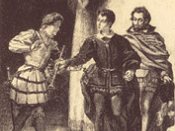In some ways, all men (and a few actresses) want to be Hamlet. He is intelligent and funny, he knows how to value true friendship (Horatio), how to tease sycophantic phonies (Rosencrantz and Guildenstern), how to treat pompous political authority (Polonius). Yet there are problems. He is glib and unconvincing in his fifth-act apology to Laertes and both confused and cruel in all of his encounters with women. My reasons for not wanting to be Hamlet, however, turn out to be theological.
Someone wisely remarked that "every fresh critic who sets out to define the intentions of the author of Hamlet ends up in his own particular dead-end in queer street."2 This is just what happened to me. Years ago, I wrote an earnest but tedious "theological interpretation" of Hamlet, defining confidently the theological significance of everything that was in the text, and of a great deal that was not: ghosts, Hamlet as Wittenberg Protestant,3 sullied flesh, suicide, sleep, kings at prayer, fifth-act conversions to providence.4
I ended up with a not altogether virtuous Hamlet, prone to violence and, at the end, confusing himself with God. That old essay had a curious performance history. In the mid-1960s, a close friend was cast as Hamlet in a production at the summer Shakespeare festival in Stratford, Connecticut. He decided to use my essay to shape his reading, stressing the darkness of the prince. The egregious Maurice Evans was the festival's artistic director, and when he saw what my friend was up to, he fired him.
But my old essay was not altogether wrong. I am still convinced that there is a shadow side to Hamlet and that it is related to his temptation to confuse himself with God. He is, after all, an exceptionally callous murderer, impetuous with Polonius (3.4.213;...


